
NC Beer is Hopping—Universities Give It Lift
Fifteen years ago, downtown Morganton was like any other small town in North Carolina. Once the sun went down, few shoe heels tapped the sidewalks. Change purses didn’t jingle. With no traffic to calm, the lights at intersections seemed to turn from green to red sluggishly—more out of habit than necessity. At night, the town was sleepy, silent, and empty.
Today, it’s a different scene altogether. Between 2010 and 2018, traffic to the town’s visitor center shot up 60 percent. At night, a trolley carries festive visitors to and fro across town. Virtually every night of the week, throngs of people gather near the town square to share stories. To laugh. To feel part of a community. Morganton now has something it hasn’t had in decades: a nightlife.
Morganton has always been ideally situated to attract outdoor enthusiasts interested in exploring Pisgah National Forest and the Linville Gorge wilderness area. But something opened the floodgates in 2010: craft brewers arrived, making the downtown district itself a destination.
The town’s transformation is by no means unique. Craft beer is reenergizing every North Carolina county that’s not dry (for the record, that’s 99 out of 100). The beer industry is now firmly woven into the fabric of North Carolina, revitalizing local economies once supported by textiles, furniture, and tobacco.
Many of these small breweries depend on the talent, research, and training pouring out of UNC System institutions to keep the taps flowing.

Brewing an Economy with Kick
A casual stroll down virtually any beverage aisle tells the story: the craft beer industry is thriving. According to data compiled by the Brewers Association, nationally, craft beer sales grew four percent in 2018, making it a 27.6 billion dollar industry.
North Carolina is a major contributor to this growth, producing more than 1.2 million barrels per year with $2.5 billion in economic impact. The state is the seventh largest producer of craft beers (per capita), and it has kicked its way to this top slot in rapid fashion. In 2011, there were fewer than 100 breweries in operation. Today there are 312.
Morganton’s revitalization illustrates how the industry is making a difference at the local level. In 2018, three craft breweries created more than 130 fulltime equivalent jobs in Burke County. Five taprooms added another 12 fulltime positions. But the more dramatic impact is at the periphery. The downtown breweries also attract visitors who also look for places to shop, to eat, and to stay.
Like so many small towns in North Carolina, Morganton’s downtown area struggled to stay vibrant as the local furniture industry downsized and retail activity moved to strip malls on the outskirts of town. But in the last five years, 20 new retailers have come to Morganton. Since 2010, public and private investors have poured $8 million into downtown.
“It’s like somebody flipped a switch … the arrival of our breweries energized the downtown,” said Morganton’s Main Street Director Sharon Jablonski. “Of course, this has generated other supporting retail, like a first rate bike shop and restaurants. Now there’s investment in a downtown hotel, which will be operational in December. Virtually every night our breweries bring people out, and that energy spreads. It has created a whole new culture downtown that’s fascinating to watch.”
And Morganton isn’t the only town feeling this resurgence. Crossroads, towns, and urban neighborhoods all across the state are once again awake.
“What we’re seeing is that these breweries become like a hub. People come in and try the beer, and then they visit other establishments,” said Dr. Erick Byrd, UNC Greensboro’s Director of the Center for Industry Research and Engagement. “Main Street in Mount Airy has always been an active tourist destination. Four or five years ago, if you went one block away from the tourist district, you would’ve found little more than vacant and run-down buildings. But since then, two breweries opened up in those empty spaces. Now, in the evening, that area is as active as Main Street.”
“This activity expands the time frame that a downtown can be active. It makes these ‘off-the-beaten-path’ areas attractive places to live for millennials,” Byrd explained. “It creates a buzz that makes these towns cool again, so more young professionals return to the community. This, in turn, attracts more businesses and investment, because now there’s young talent and disposable income.”
The economic impact of the craft brew industry is so significant that business and community leaders are committed to supporting its growth. But, now that the market has fully matured, sustaining this growth becomes more of a challenge. Start-up breweries need to maintain rigorous quality standards and develop strategic business plans if they are to survive, and this is precisely where UNC System expertise gets added to the mix.
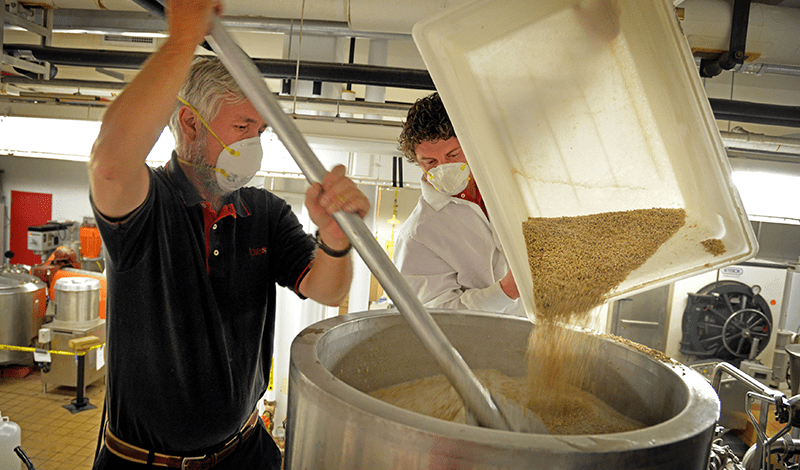
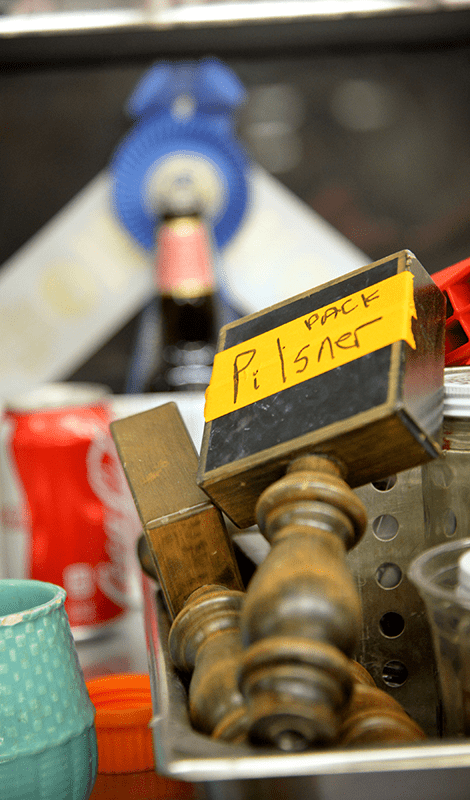
The Science That Has NC Bubbling
“From an educational point of view, when industry grows too rapidly, product quality suffers,” said Dr. John Sheppard, coordinator for NC State’s undergraduate Bioprocessing Science Program. “A lack of skilled people leads to difficulty maintaining consistent quality. To maintain a healthy, vibrant, and profitable craft industry, there needs to a greater emphasis on the science behind the brewing.”
The fermentation integral to brewing beer is tricky, and when things go wrong, the results can be foul stuff. A tasty beer depends on the brewer’s technical mastery of a process that synthesizes chemistry, math, biology, and engineering. NC State’s Department of Food, Bioprocessing, and Nutrition Sciences and Appalachian State’s A.R. Smith Department of Chemistry and Fermentation Sciences are both producing talent with the theoretical comprehension that can make the difference between fixing a “stuck” mash and flushing thousands of dollars’ worth of ingredients and labor down the drain because a batch has gone bad.
“The industry is desperate for trained expertise, and that’s reflected in the fact that virtually 100 percent of our graduates have jobs waiting for them when they leave the university,” said Dr. Brett Taubman, director of Appalachian’s Fermentation Sciences program. “It’s getting to the point where I feel like I can go to practically any brewery in the state and get a free beer, because I have graduates placed all over. It’s an awesome thing, getting to this point that we have so many graduates placed throughout the state, the region, and even the country.”
Both institutions also offer their expertise to local breweries in the form of lab services, which can provide a measure of a beer’s ABV (alcohol by volume), nutritional value, microbial content, bitterness units, and the myriad of other factors that can impact quality.
“The brewing process is the oldest bioprocess there is – it’s engineering and biology working together. You can’t have one without the other,” Sheppard said. “For example, you can have a beer that’s been flavored with all kinds of ingredients, but is no good because it’s flat. That’s where testing and analytics can help ensure quality control.”
While large, macro breweries also offer lab services to independent brewers, UNC System labs offer a rigorous research-based service, which can be critical when a brewer is facing a serious challenge. If, for example, a brewer discovers an infection in a batch, the research experts at NC State and Appalachian can offer a detailed problem-solving analysis.
For most North Carolinians, NC State’s and Appalachian’s lab work might easily slip under the radar. But these institutions’ contributions enhance the taste profile of North Carolina’s craft beer culture in other, more palatable ways.
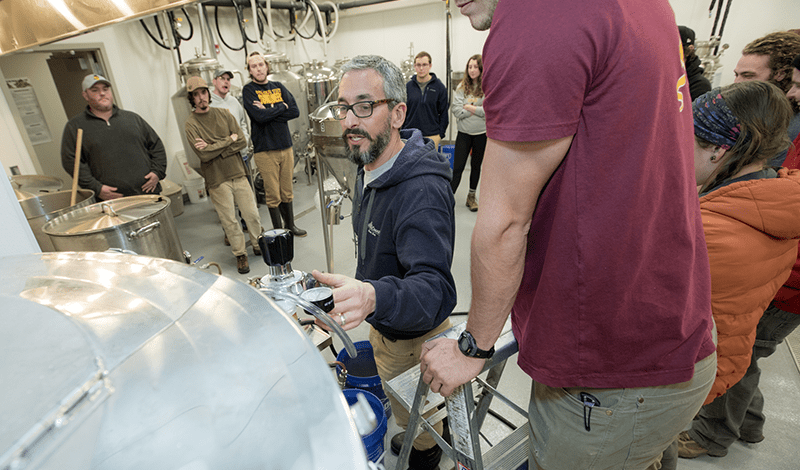
In the basement of Schaub Hall, the NC State Brewing Lab churns out more than 50 barrels of carefully crafted beer annually under Sheppard’s guidance. In addition to the beer that is sold at on-campus events and select locations around Raleigh, the lab is also the source for a new yeast strain. This new strain allows brewers to produce sours without adding bacteria, something that more traditional recipes require. Eliminating the need for additional bacteria reduces the risk of contaminating other products. Several brewers have sublicensed the strain through the university, including Ecusta in Brevard, Fiddlin’ Fish in Winston-Salem, and Nicklepoint in Raleigh. In short, Sheppard’s research is enhancing efficiency and tickling taste buds in taprooms from the mountains to the coast.
At the same time, NC State’s agricultural extension work supports the industry in other ways. For example, in March, the university organized the 2019 South Atlantic Hops Conference, bringing together extension experts and the south east’s hops farmers.
“Yields here are not what they are in other parts of the country,” said NC State Extension Specialist Jeanine Davis says. “We are working to develop new varieties that will increase yields. In the meantime, though, there are creative farmers, chefs, florists and others who are thinking outside the box to maximize their income with locally grown hops.”
At Appalachian, Taubman brings science, great taste, and consumers together for the High Country Beer Fest. Having just celebrated its twelfth year, it is one of the oldest and most highly regarded beer festivals in the state.
“Part of the reason why our festival is so popular is the location. Everybody loves to come to Boone in the late summer when it’s a thousand degrees down below, and it’s beautiful up here,” Taubman said with a laugh. “But our emphasis on education is really attractive to brewers. Unlike other festivals, it’s not just a frat party driven by the goal to sell as many tickets as possible. We keep things boutique and really emphasize education as part of the event.”
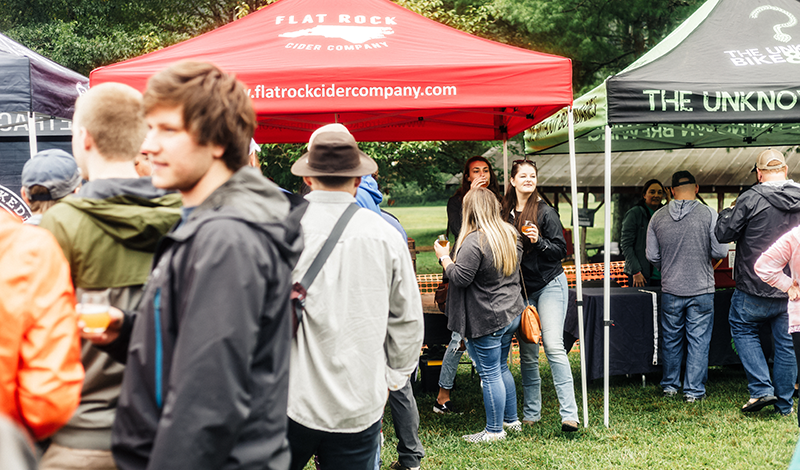
This year’s festival, for example, featured seminars designed to help beer aficionados harness the delicious-ness of fermentation to promote healthier eating habits. Attendees had opportunities to learn the processes for making fermented foods, non-alcoholic beverages, hot sauces, vinegars, and vegetables.
More to the point, the festival provides a critical platform for startup and small brewers to establish statewide or regional awareness of their product, and for established brewers to spotlight their latest flavors. This year, more than 60 brewers participated, some from as far away as California, Texas, and Colorado. But the vast majority on hand were North Carolina’s own, from every corner of the state, including Morganton’s Catawba Brewing, Fonta Flora, and Sidetracked Brewery.
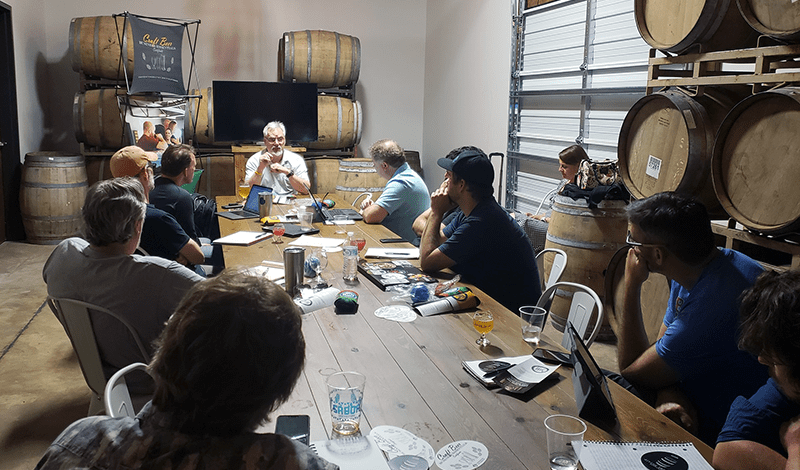
The Business of Staying on Top
“When you look at national stats, North Carolina shows up as having the most breweries on the east coast. Oregon and California are lit up on the west coast for this metric. But on the east coast, it’s North Carolina. Florida’s showing up a little bit, but as far as having a mature craft beer scene, we are the state on the east coast,” said Kitty Price, Highland Brewing’s key account director and sales team leader.
Diving into or staying afloat in a mature beverage market isn’t without risk. When North Carolina’s beer industry was seeing double-digit growth, success came easily to most startups. But now there is much more competition, making it imperative that breweries come into the field with a business plan that’s just as enticing as their product. Even established brewers face unique challenges in a mature beer market. Beer enthusiasts aren’t necessarily loyal; they like to experiment and try new places. This means opportunity for new startups who need to lure in customers. But holding onto clientele with palates that like to wander can prove to be a challenge for established venues.
Graduates from UNC System business programs are naturally primed to help—just ask Ms. Price, who joined Highland Brewing shortly after completing her MBA program at Western Carolina University.
Asheville is one of the hubs in North Carolina’s brew industry, and Highland Brewing is at the epicenter of this activity—established in 1994, it was the city’s first brewery. Nevertheless, this long-established fixture still depends on UNC System talent to stand out in a town with 25 other breweries and in a state with nearly 300. In addition to depending on Price’s sales leadership, Highland has also benefitted from consultant work offered through WCU’s branch of the state-wide, UNC System-operated Small Business and Technology Development Center (SBTDC). Most recently, for example, the company turned to the SBTDC for input on how to increase onsite business at its taproom.
“The SBTDC is great,” said Price. “It’s proven to be a very valuable business resource that gives us access to valuable university research and innovative student talent that has helped us continue to grow.”
Highland Brewing’s situation isn’t unique. Entrepreneurs across the state are realizing that formal training and rigorous research can strengthen a company’s ability to create a sound business plan. To address this need, UNC Charlotte has established a Craft Beer Business Essentials Certificate program. The accelerated curriculum provides homebrewers, entrepreneurs, and business professionals with the foundational business knowledge, tools, resources, skills, and networking opportunities to be successful. Course content covers everything from the initial stages of creating a business plan all the way through to making a profit and increasing distribution.
“Before we established our program, we conducted a survey and learned that there were a lot of North Carolinians who were going outside the state to enroll in business courses tailored for the beer industry,” explained Program Director Karri Hahn. “We developed our certificate to fill what was clearly a growing need in our state.”
Hahn explains that the program is driven by the mission to help the industry get creative with its strategies to entice more people to choose local craft brews over “big beer.” Hahn also stresses the importance of getting more women and minorities involved—not just as employees but as consumers.
“There’s still lots of growth potential. The question is how to tap into that,” she explained enthusiastically.
Richard Greene, executive director of the North Carolina Craft Brewers Guild, agrees that the UNC System has a pivotal role to play equipping entrepreneurs with the business sensibility they’ll need to survive in a competitive climate.
“The beer industry is a hard business. The margins are tight. You are beholden to suppliers and having access to what you need. It’s tightly regulated. It’s expensive to make beer, especially if you’re a small brewery, only making 500 barrels a year. Having the universities creating a, ‘Here’s what you need to know from a business environment’ knowledge base is really critical,” he explained.
To this end, UNC Charlotte’s program has partnered with industry leaders so that the program doesn’t just serve the students … it serves North Carolina. Industry leaders sit on the advisory board and in front of the classroom, designing and delivering the robust curriculum. Although the university designed the program to give budding entrepreneurs a leg up as they enter the business, it’s also attracting students who are already in the industry.
“Some small towns like Gastonia and Lincolnton, as part of their revitalization projects, have identified microbreweries as something they want to bring to their town. There are huge advantages for breweries going to small towns: taxes, water quality, cost of real estate. But it can be difficult for those just entering the business to find these opportunities,” explained Hahn. “Our network will help us put graduates in contact with those leads in small towns.
In addition, UNC Charlotte is an affiliate member of the NC Craft Brewers guild, which has the long-term goal of establishing an educational consortium that will allow educators across the state to share student leads. This will help students in one institution’s program connect with students graduating with complementary skills from another program.
A decade ago, an enthusiast with a flair for tasteful innovative stood a good chance of transitioning from the garage to the storefront. Today, market competition makes that leap much more of a challenge. By putting brewers in touch with business expertise, the UNC System improves the odds that a tasty batch will become a profitable one.
Putting the Public in Public House
“Two of my partners had lived all over before they meandered back home to Morganton—the town where they grew up” mused Fonta Flora’s Director of Brewing Operations Todd Boera, who has relied on Appalachian’s lab services for years. “They wanted to see Morganton grow as a community, and Fonta Flora is an expression of their desire to fuel that growth.”
This craving for community is integral to North Carolina’s beer obsession. An early study of North Carolina’s beer industry that came out of UNC Greensboro’s Bryan School of Business and Economics established that most consumers crave comradery, not inebriation. They gather in taprooms because they want to feel connected to the people and the places around them. Conversation is beer’s true intoxicant.
For eleven years, the Bryan School’s Executive in Residence Sam Troy, Assistant Professor Dr. Bonnie Canziani, and Dr. Erick Byrd have been forging partnerships with wineries across the state to help cultivate North Carolina’s wine industry. Recently, they’ve also turned their attention to North Carolina’s craft beers. Not surprisingly, much of their effort inevitably helps taprooms capitalize on their function as the “public house” where members of the community gather to discuss, deliberate, and laugh.
For example, they recently helped one entrepreneur prepare to launch a new taproom in Pilot Mountain. He had plenty of expertise in the backroom processes, but had little experience handling hospitality on the front end. So he reached out to Byrd and his hospitality and tourism students for advice on how to create an inviting atmosphere. Elsewhere, when Angry Troll Brewing decided to expand into the restaurant business, the partners sought advice on how to brand the restaurant’s virtual and retail spaces. Not surprisingly, among other things, the Bryan School team offered pointers on how to highlight the décor in order to accentuate the building’s long history in the Elkin community.
Cultivating a regular clientele requires far more than getting customers in the door. It depends on creating a welcoming environment inside the establishment—and, quite often, it depends on efforts outside the establishment as well.
Thirsty Souls is situated in the heart of Mount Airy, and the brewery enthusiastically embraces its status as the pulse of the community. Recognizing that the bar’s parking lot stood empty and unused during daylight hours, its owners hatched a plan to transform the space into a community marketplace during the day. UNCG hospitality and tourism students helped develop the strategic plan, identifying potential industry partners, vendors, and potential crafts that would enhance the Thirsty Souls brand.
Unlike other, more high-tech industries, craft brewers often embrace and try to preserve local history. In part, this is a matter of pure practicality: the empty factory spaces and mill buildings are ideally suited for brewing operations. The rent is affordable, the space is ample, and the water supply is generous.
The end result is that brewing operations bring new life in old and abandoned areas.
“Just as the wine industry encourages people to go out and spend money in rural spaces, craft beer is doing the same thing in urban areas and small town centers. This helps preserve landscapes that have an important but forgotten history,” explained Byrd.
To state the obvious, building this shared sense of history is important in building community. These repurposed buildings are doorways in time, helping consumers rediscover the past … and neighborhoods to rediscover their future.
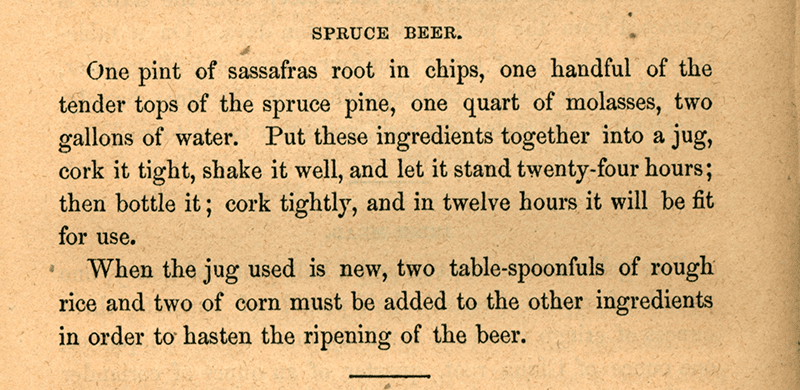
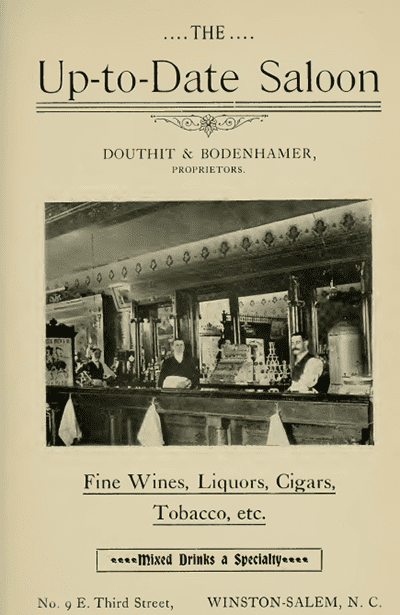
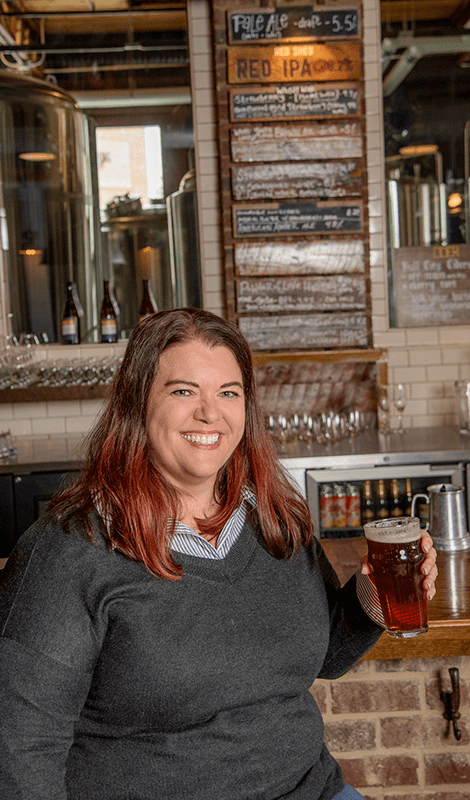
When it Comes to NC Beer, The Future is History
UNCG Archivist Erin Lawrimore, UNCG University Libraries Digital Technology Consultant Richard Cox, and Digital Projects Coordinator David Gwynn support the craft beer industry from a slightly different angle: they document and preserve its history.
Although some of their work digs into NC brewing’s distant past, Lawrimore, Cox, and Gwynn focus largely on preserving more recent history.
In part, this involves saving and carefully curating material culture for future reference: glassware, marketing materials, records and receipts, photographs, and the like. These efforts grow naturally out of UNCG’s legacy as a woman’s college. The library’s rare books collection features a significant number of publications from the 1700s and 1800s targeting housewives— including cookbooks with traditional homebrew recipes that use regional staple ingredients, such as persimmons and molasses.
Lawrimore and Cox are also busy collecting an oral history of the industry, interviewing various brewers and entrepreneurs who have had an impact in the state. Well Crafted NC began in 2017 as an effort to document the Greensboro beer scene, but soon Lawrimore and Cox realized the necessity of expanding the project.
“The industry is so interconnected that simply focusing on one downtown area could never tell the full picture. So we began conducting additional historical research to expand our timeline of North Carolina brewing history,” explained Lawrimore. “We identified key people in the industry across the state. These included interviews with folks like Uli Bennewitz [owner of Weeping Radish, the first ever brewpub in North Carolina] and Sean Lily Wilson [owner of Fullsteam Brewery in Durham and one of the leaders of the Pop the Cap movement that successfully fought to raise the ABV cap in North Carolina].”
Since then, Well Crafted NC has interviewed industry leaders from Cherokee to Currituck, and it has dedicated special attention to documenting how women brewers and brewery owners are transforming North Carolina’s beer scene.
This work will, in all likelihood, have a profound impact on the long-term success of NC beer. Many of the brewers who entered the business ten years ago are now cashing in or retiring. This archival work is capturing their history to help educate the next wave of entrepreneurs.
In addition, preserving materials will ensure that those materials will be carefully stored, catalogued, and easily accessible years from now. Whenever an established brewery wants to build a marketing campaign around a milestone anniversary, resurrect an old logo, or even revisit an abandoned recipe, partners won’t have to rifle through stacks of old musty boxes to find what they’re looking for.
“Look at textiles or tobacco. Imagine the value if we’d been able to document those industries as they were happening or at their height,” explained Cox. “We’re going to have a lot of research data for a $7 billion dollar industry—maybe the North Carolina industry in 20-30 years.”
“This has already generated a lot of interest from the industry,” Cox continued. “Usually when we find out that a craft brewery is closing, it’s because another brewer has let us know. They’re hoping we can do something to try and get some records. They understand that this is something that could be beneficial to them.”

In January 2019, Well Crafted NC, the Bryan School, and the Triad Brewers Alliance officially partnered to help breweries in the Triad area develop their stories. The long-term goal is to use this research to build a regional strategic marketing plan promoting the Triad as a craft beer destination.
But Lawrimore also makes it clear that the work doesn’t just benefit the industry. It benefits North Carolinians more generally.
“Craft beer is an industry that touches on more than the people who go have a nip in the taproom. This is historic preservation. This is repurposing old textile mills that, goodness knows what would have happened to them if breweries hadn’t moved in. Industrial spaces aren’t exactly in high demand in small rural towns these days,” she explains. “This industry is rediscovering the cultural value in places and traditions that might otherwise have been forgotten.”
Just recently, for example, Lawrimore has been collaborating with a graduate student from the Public History department and an archivist at Winston-Salem’s Historic Bethabara Park, site of North Carolina’s first documented brewery, dating back to 1756. Together, they are developing a park exhibit exploring the history of Triad beer.
More than that, they are trying to convince an operational North Carolina brewery to resurrect a historic Bethabara recipe as a heritage beer. These efforts exemplify how the intermingling of past, present, and future is so central to North Carolina’s vibrant beer culture. The Well Crafted NC project isn’t driven by the goal of preserving history under glass; it’s motivated to bring that past to life so that it can tantalize tongues and stimulate dialogue in the here and now.
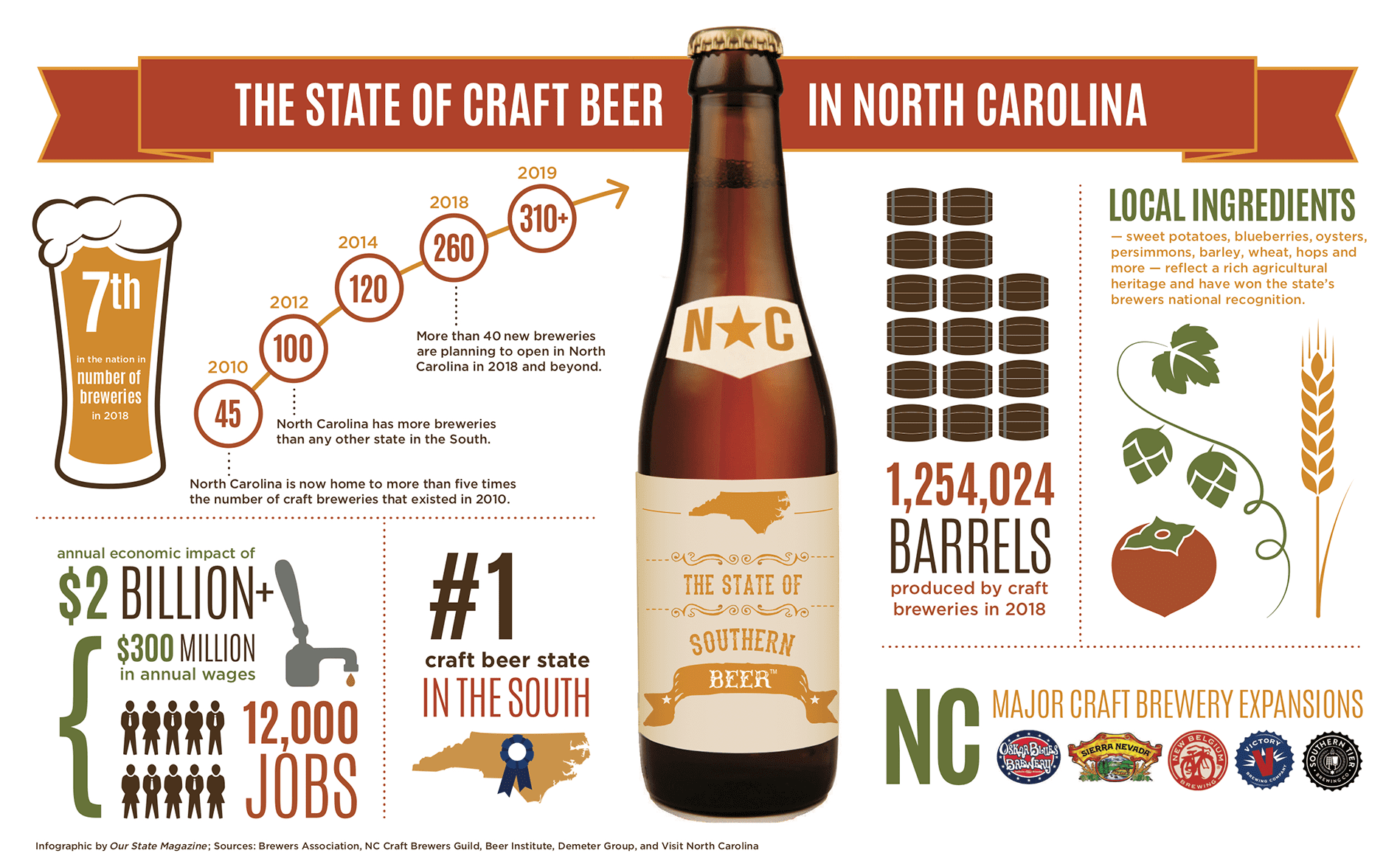
A Vibrant Start, A Lingering Finish
Even a brief conversation with Brett Taubman makes it abundantly clear that he is proud of the contributions Appalachian has made to an industry that has virtually every corner of North Carolina hopping.
“We have been involved since the very beginning of the craft beer explosion in this state,” he mused. “We started the High Country Beer Fest to support the industry a dozen years ago when there were only a handful of breweries across the state. Now there are upwards of 300. I’d like to think that we played a role in that—that we helped by getting the word out, getting products in the hands of folks around North Carolina and the south east, offering the analytical services, and providing the graduates to help the industry grow.”
The NC craft beer industry has, without a doubt, witnessed meteoric expansion over the past five years. Now the challenge is to sustain this growth. UNC System institutions helped nurture this growth in the beginning. NC Craft Brewers Guild Executive Director Richard Greene is confident that the UNC System will be just as critical moving forward, and that the industry will benefit by expanding its partnerships with the University.
“I can’t think of an industry that’s been successful that hasn’t partnered with the higher education system. You have to be able to do that. The university system isn’t trade school, but it’s the grounds where you’re teaching people how to think. You’re teaching them how an industry works,” he explained. “We are the state for Southern beer. If the educational system continues to produce the talent and research we need to feed the industry, we will ensure that North Carolina isn’t just the South’s leader in craft beer … we will be the national benchmark for quality and variety.”